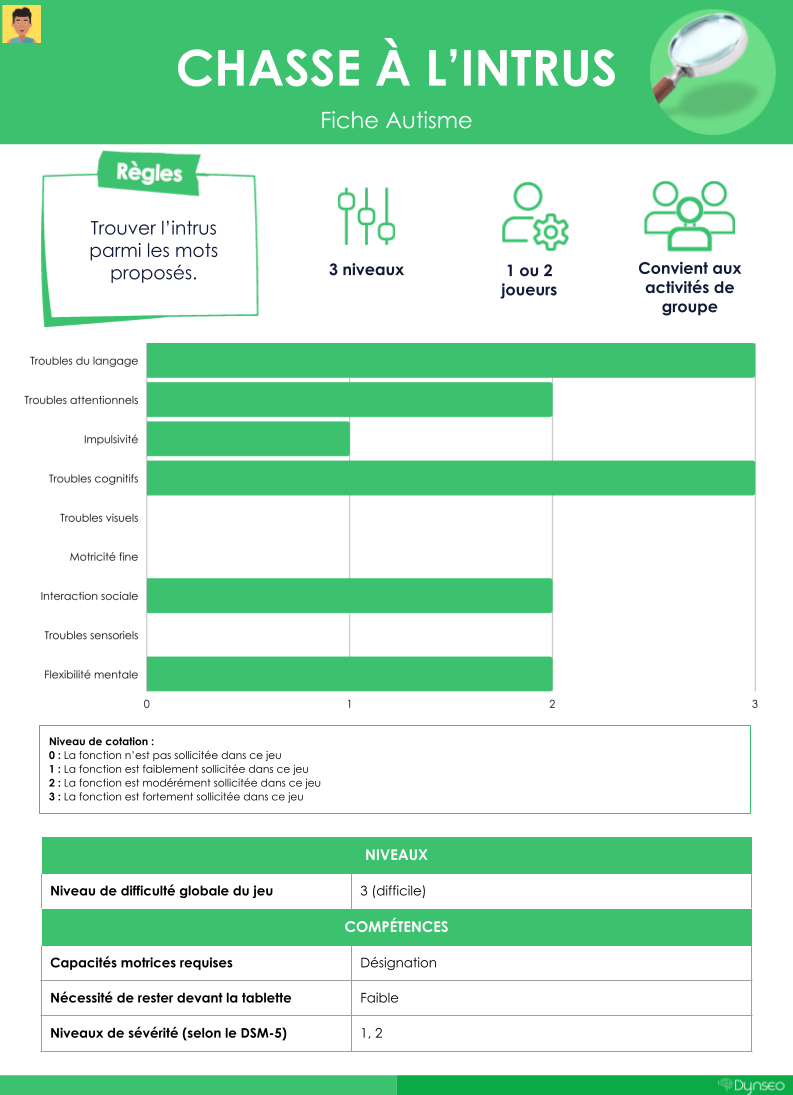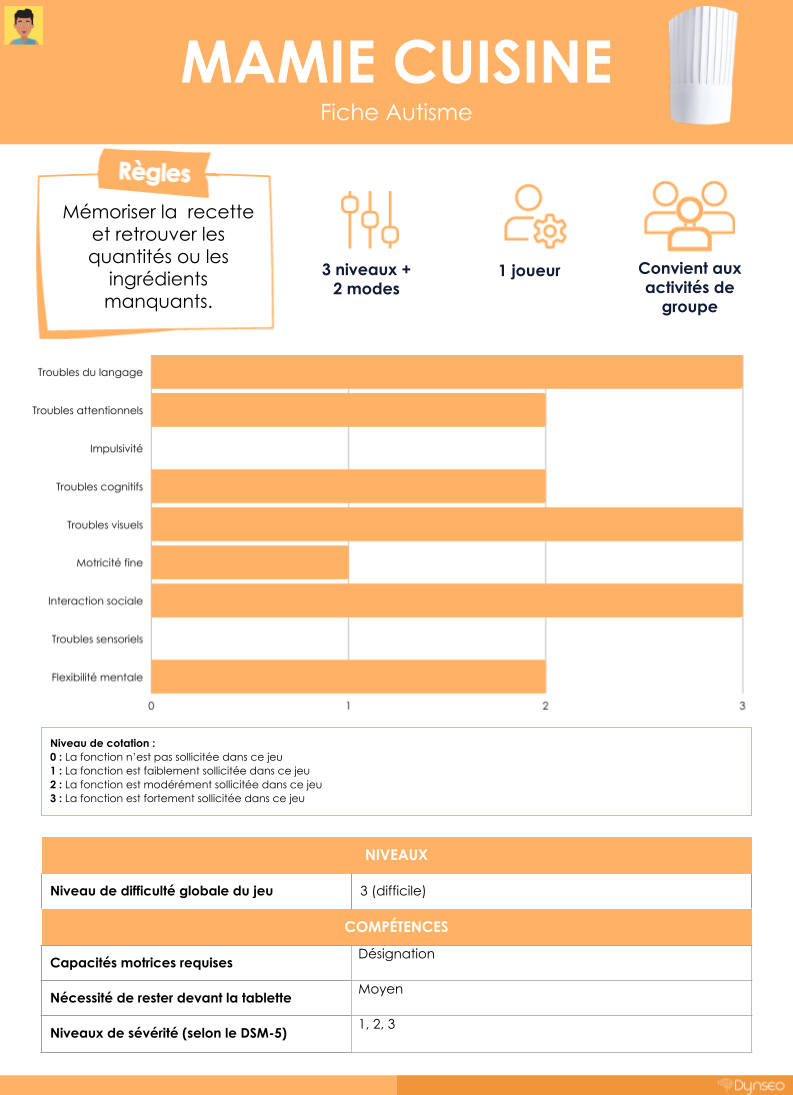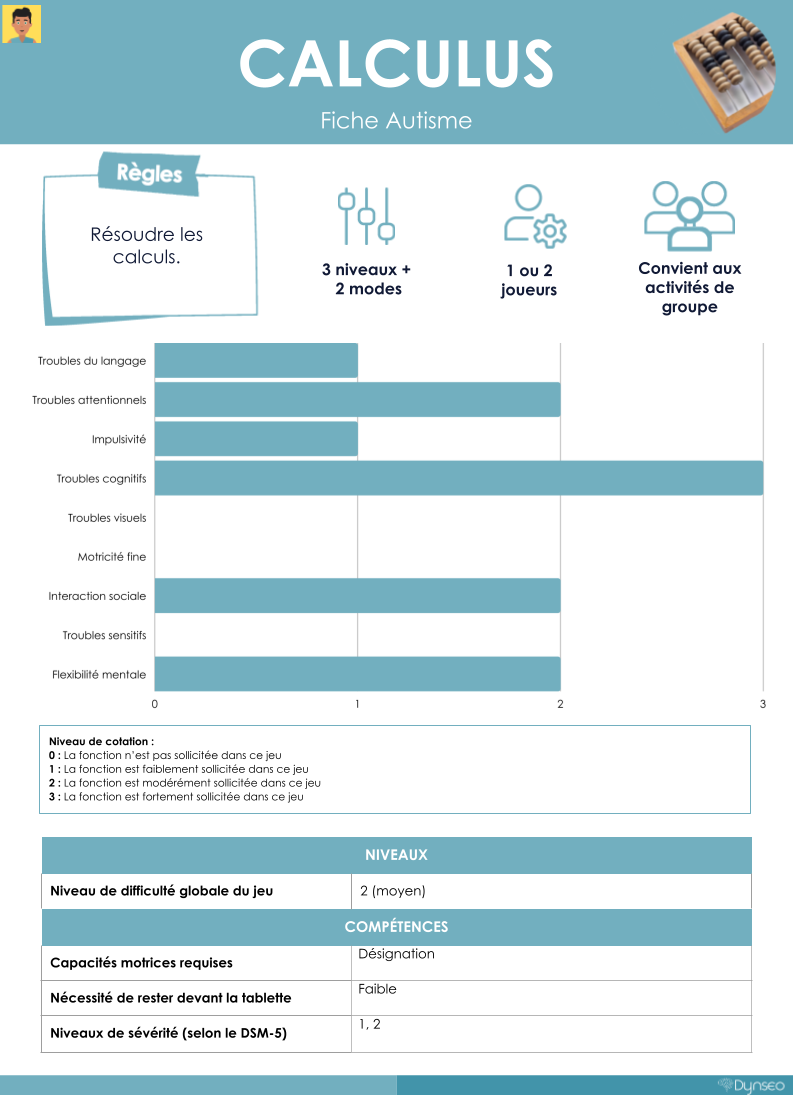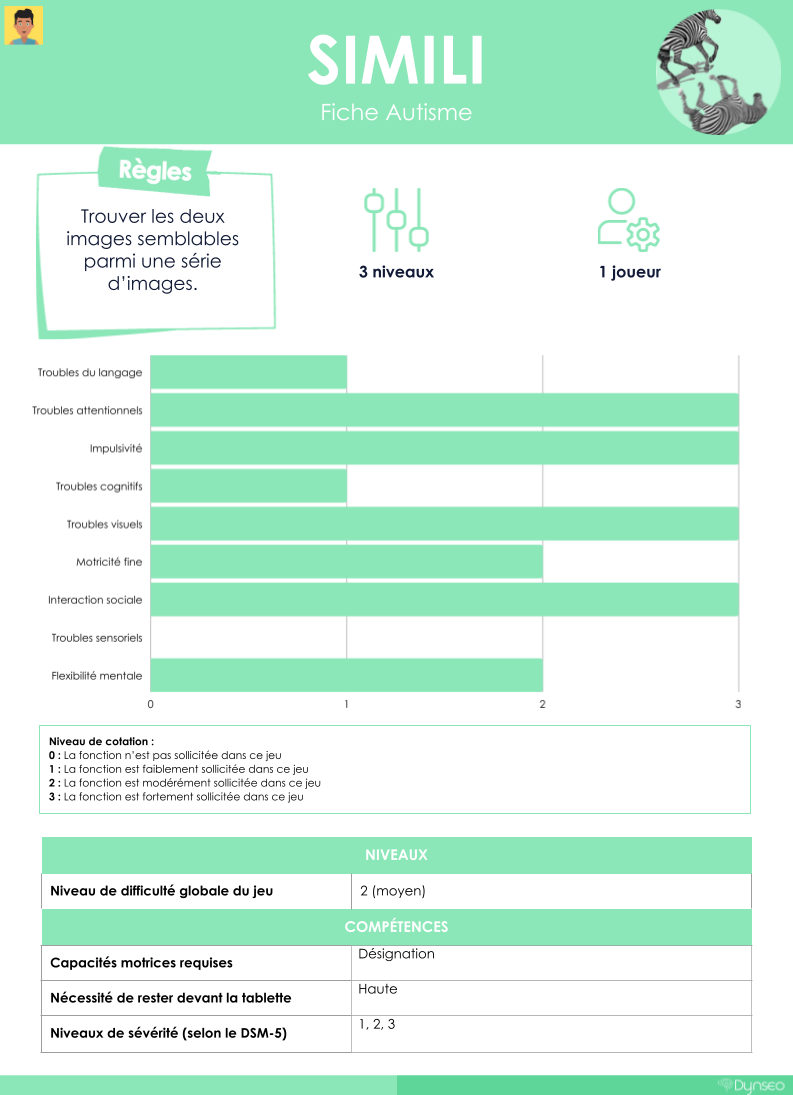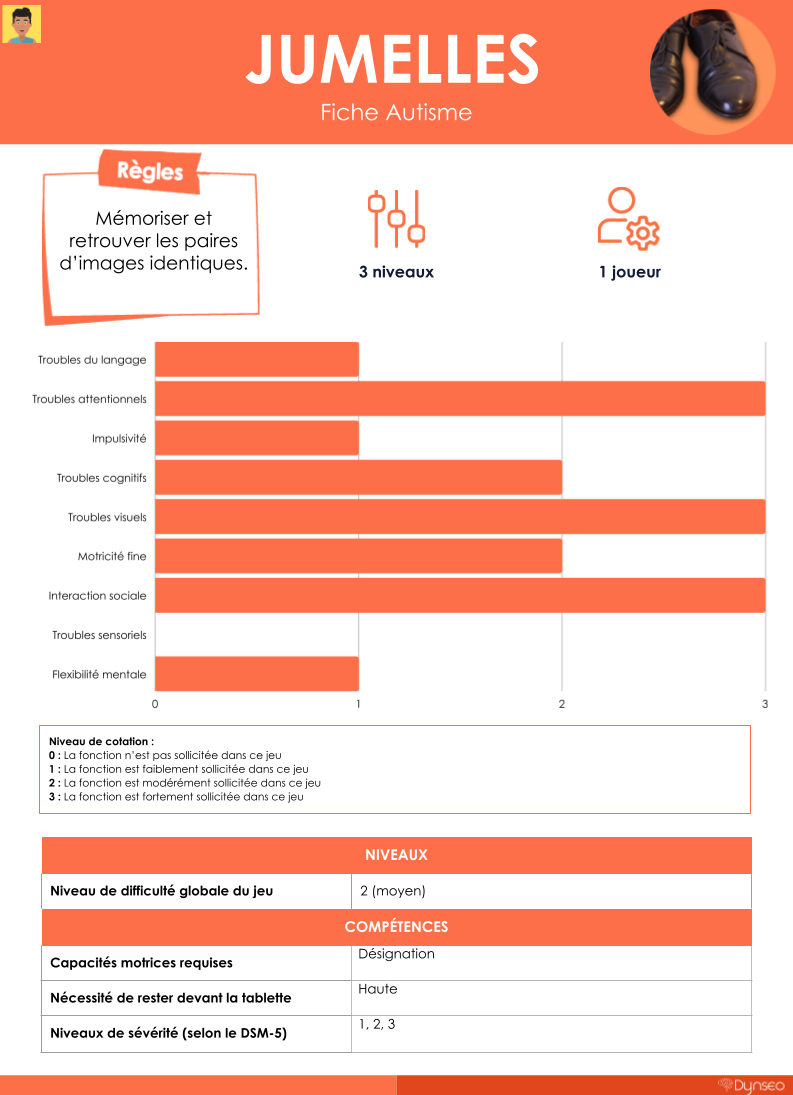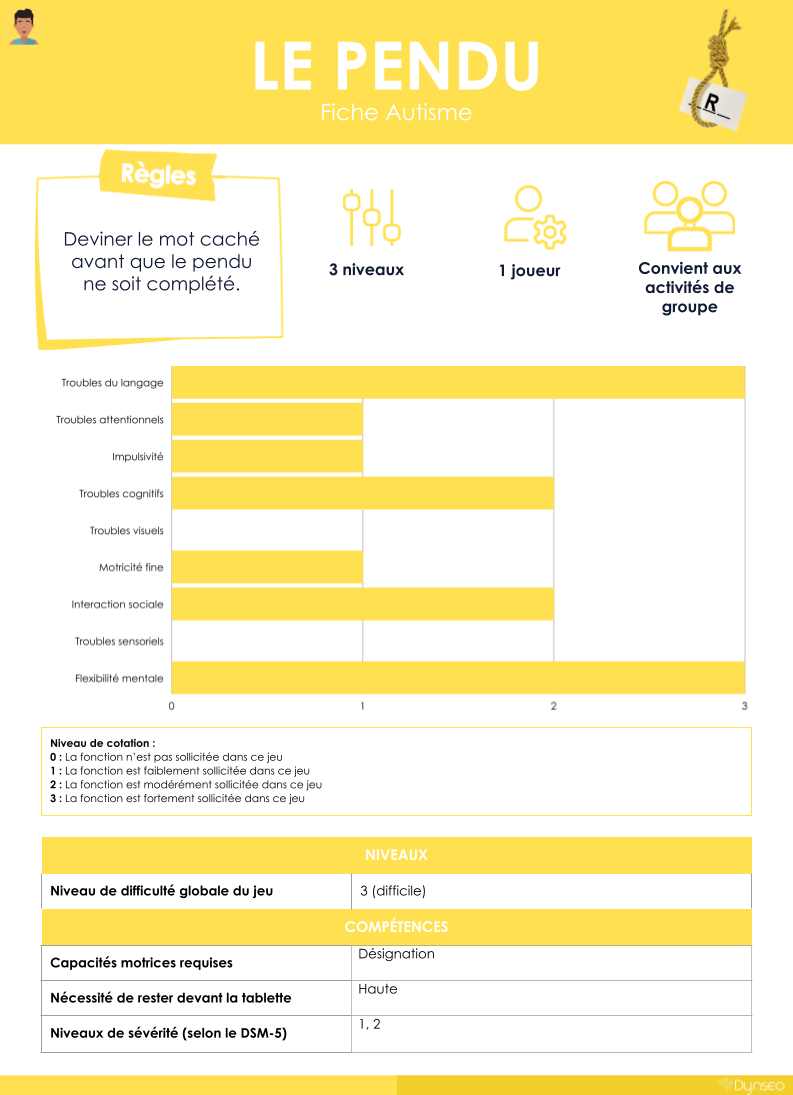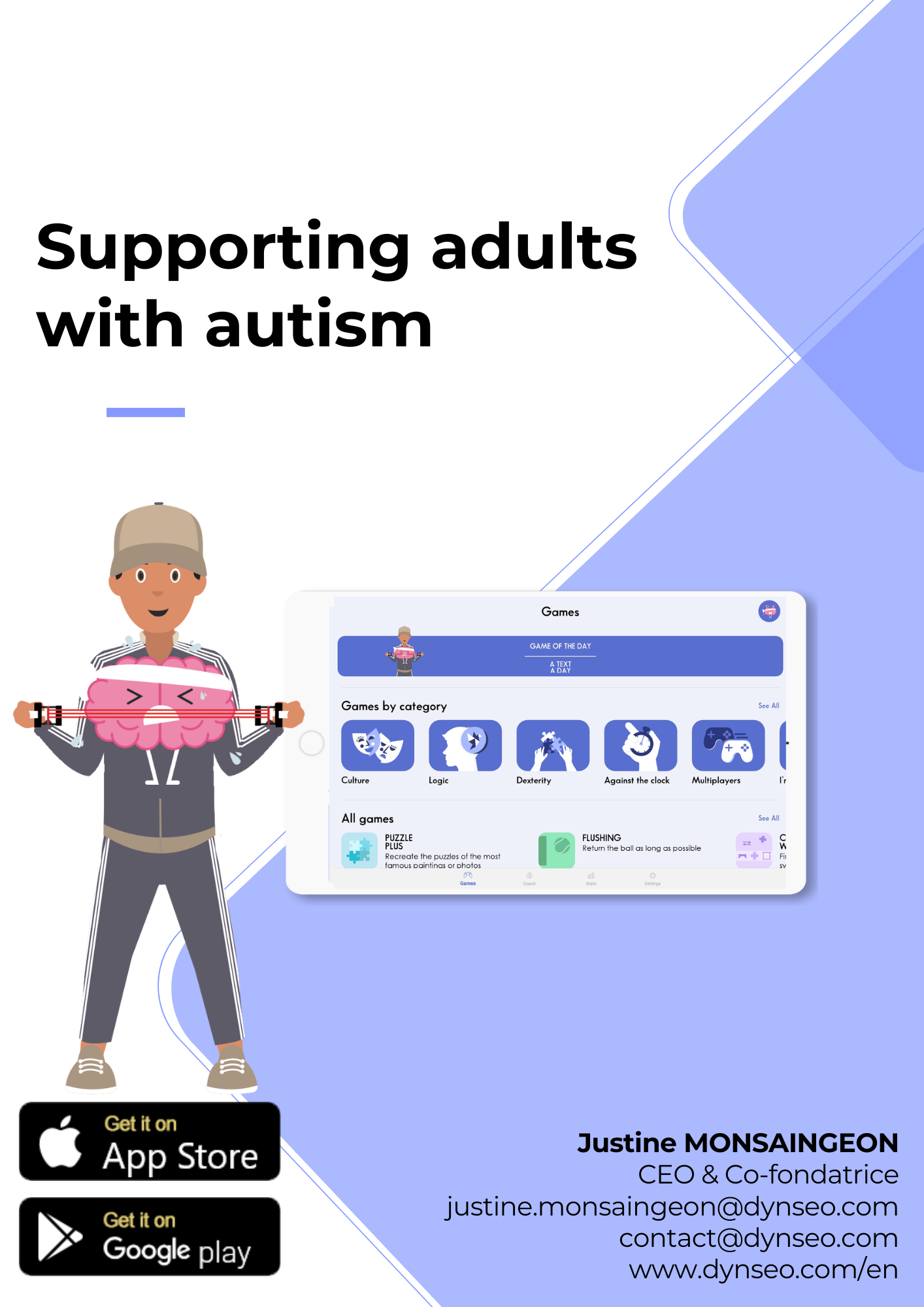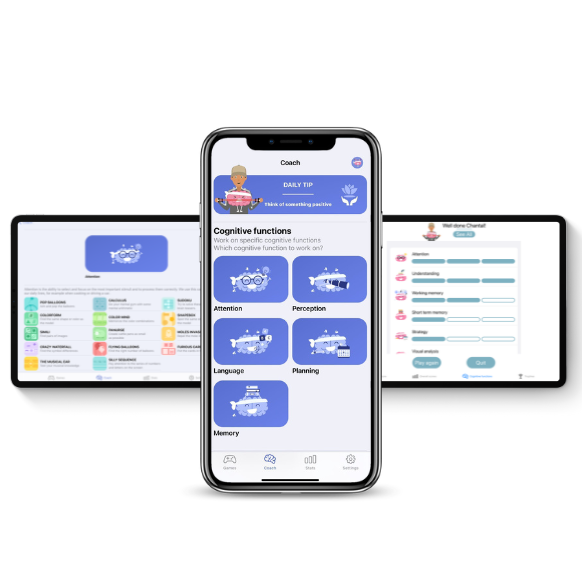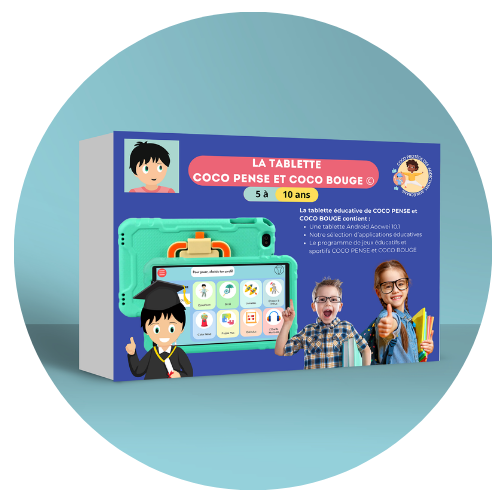Dynseo proposes
AUTISM IN ADULTS with CLINT

Dynseo and its team are deeply involved in helping people in need, and our aim is to enable everyone to live in harmony and serenity. For some people, the way they perceive the world, and therefore the way they live, is different, as in the case of autistic people.
Dynseo offers CLINT, a cognitive coach on tablets and smartphones for adults with autism. CLINT stimulates the cognitive functions involved in the autonomy and daily activities of autistic people.
Autism is a developmental disorder that can cause difficulties with language, behavior and social relationships, perception, motor skills and cognition. Autism is diagnosed in childhood, but it can sometimes be discovered in adulthood. Autism cannot be cured, but it is possible to learn strategies to reduce difficulties. For us, autistic people are adults like any others, which is why in our cognitive Joe application you won’t see the term autism. This means they can use a useful and entertaining application without the burden of illness.
Don’t panic, this guide will help you understand which games to use according to the different forms of autism and the goals you want to achieve!
Mild Form
Stage 1
Limited social communication
Specific Interests
Repetitive behaviors
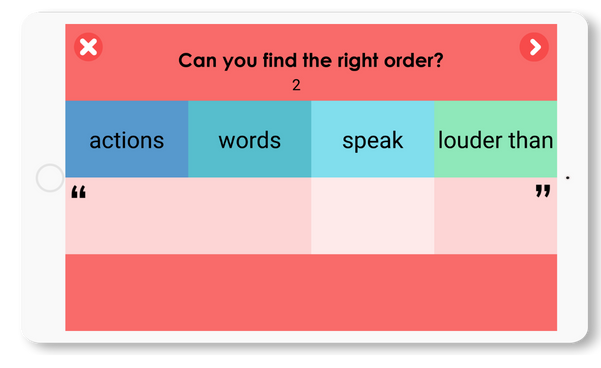
Moderate Form
Stage 2
Isolation
Difficult social interactions
Need to control the environment
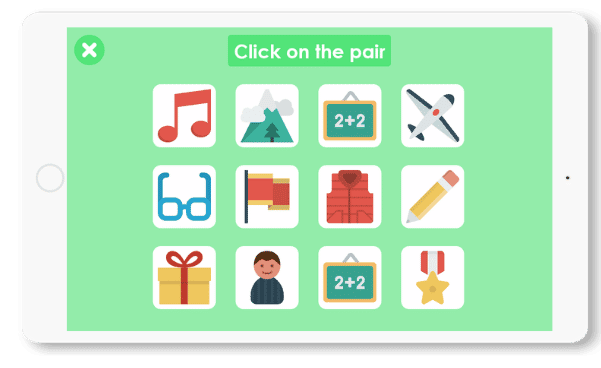
Severe Form
Stage 3
No relationship with others
Fixed ideas
Difficulty changing habits of behavior
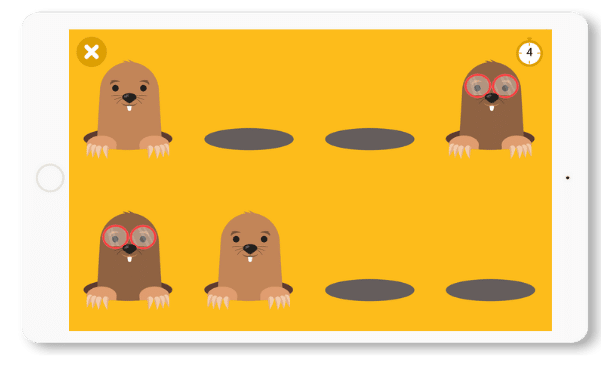
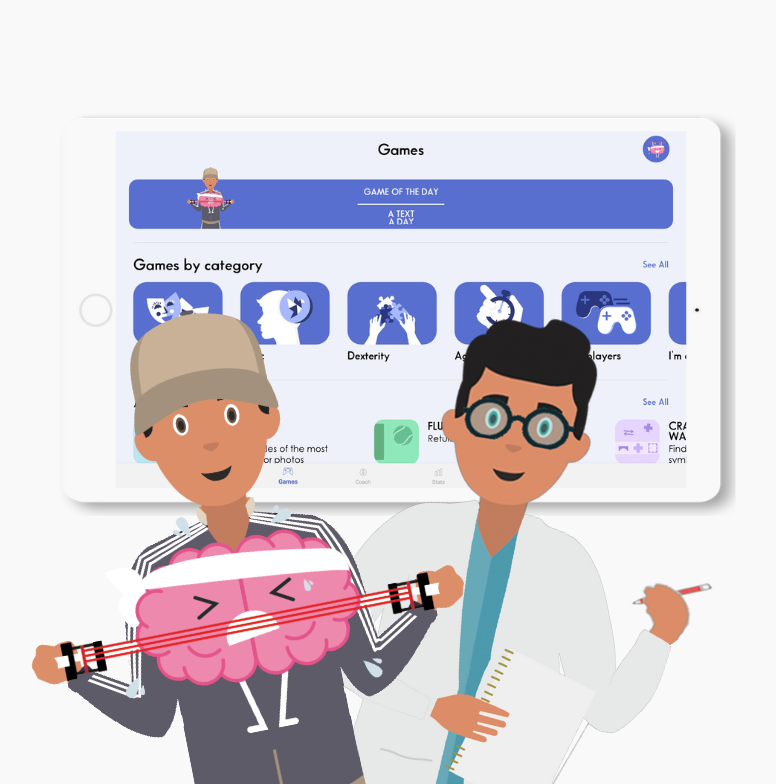
CLINT, the app for adults with autism
CLINT is an application used by autistic adults at home or with a healthcare professional, who may be a speech therapist, occupational therapist, professional educator, psychologist or psychomotor therapist. All professionals wishing to subscribe to CLINT can benefit from a web-based performance tracking platform. This makes it possible to see how autistic people are evolving and improving, and thus to personalize their care.
You can take the CLINT app with you wherever you go, because the app doesn’t need Wi-Fi to work, only updates.
It’s possible to work with an autistic person by proposing activities adapted to their needs. In the CLINT app, there are over 30 games adapted for adults to effectively stimulate the various cognitive functions while having fun. People with autism are often treated by several therapists, but it’s important to remember that they need to be motivated to undergo therapy, which is why it’s a good idea to start with games. CLINT therefore proposes a solution that takes into account both the person’s side (proposing playful games) and the practitioner’s side (proposing cognitive stimulation games). It’s a win-win situation!
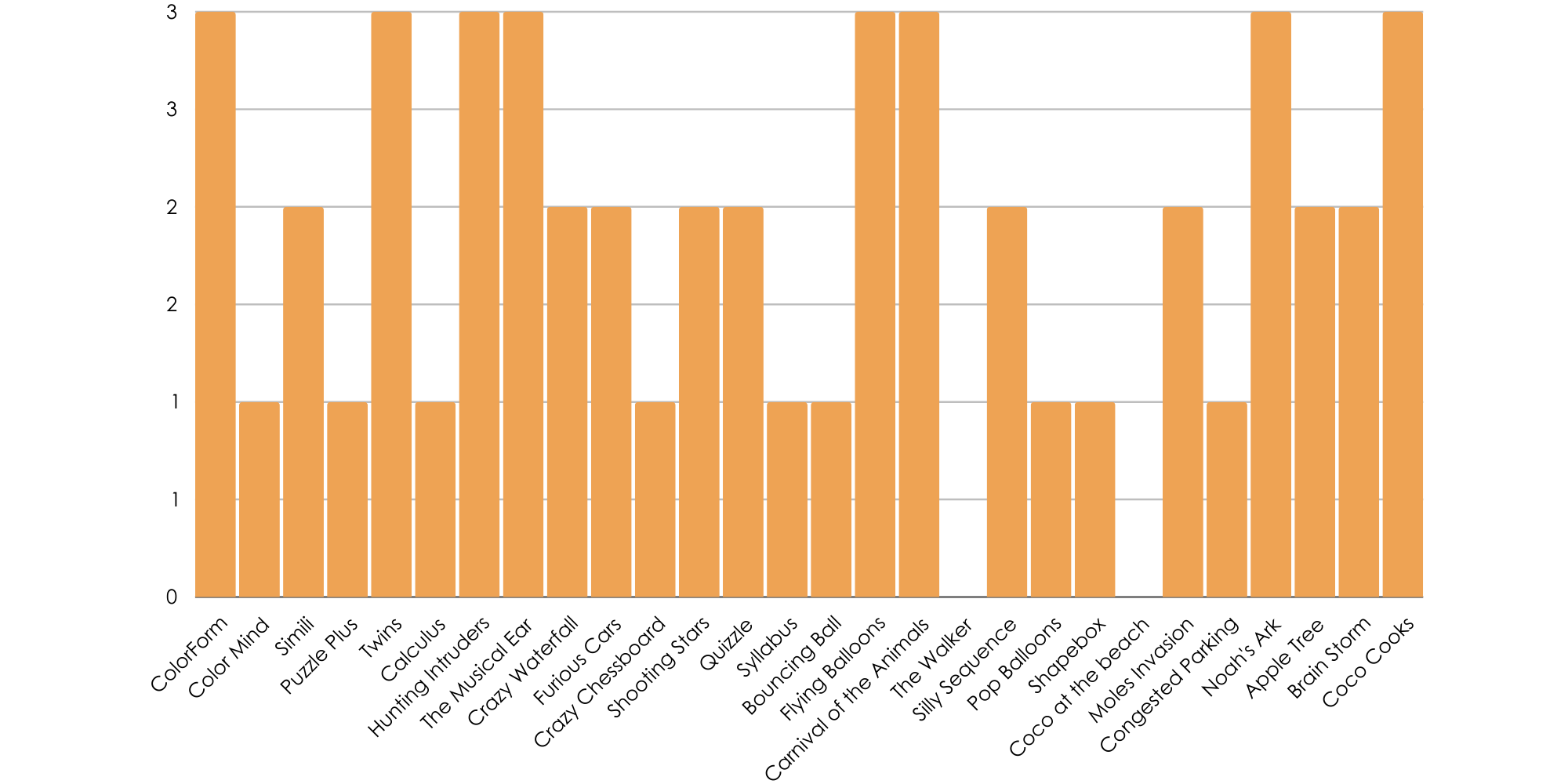
CLINT games adapted to autism
IN THIS GUIDE
01.
Games adapted according to the form of autism
Explore the diversity of games designed specifically to accommodate different autism spectrums, providing enriching and inclusive play experiences for all.
02.
Areas of fragility in autism
Identify and understand areas of fragility of adults with autism to better support them, highlighting the unique challenges they face and proposing tailored strategies to strengthen their well–being.
03.
Adults with autism and work
Adults with autism may face specific challenges in traditional work environments. Adapting professional practices to meet their needs can help them thrive and make a meaningful contribution to the world of work.
04.
BONUS: emotions in adults with autism
Adults with autism can feel and express emotions in profound ways, although their manifestation may differ from that of neurotypical people. Empathic support and an understanding of their specific emotional needs can support their well–being and social integration.
I would like to receive the complete guide to accompanying adults with autism with CLINT
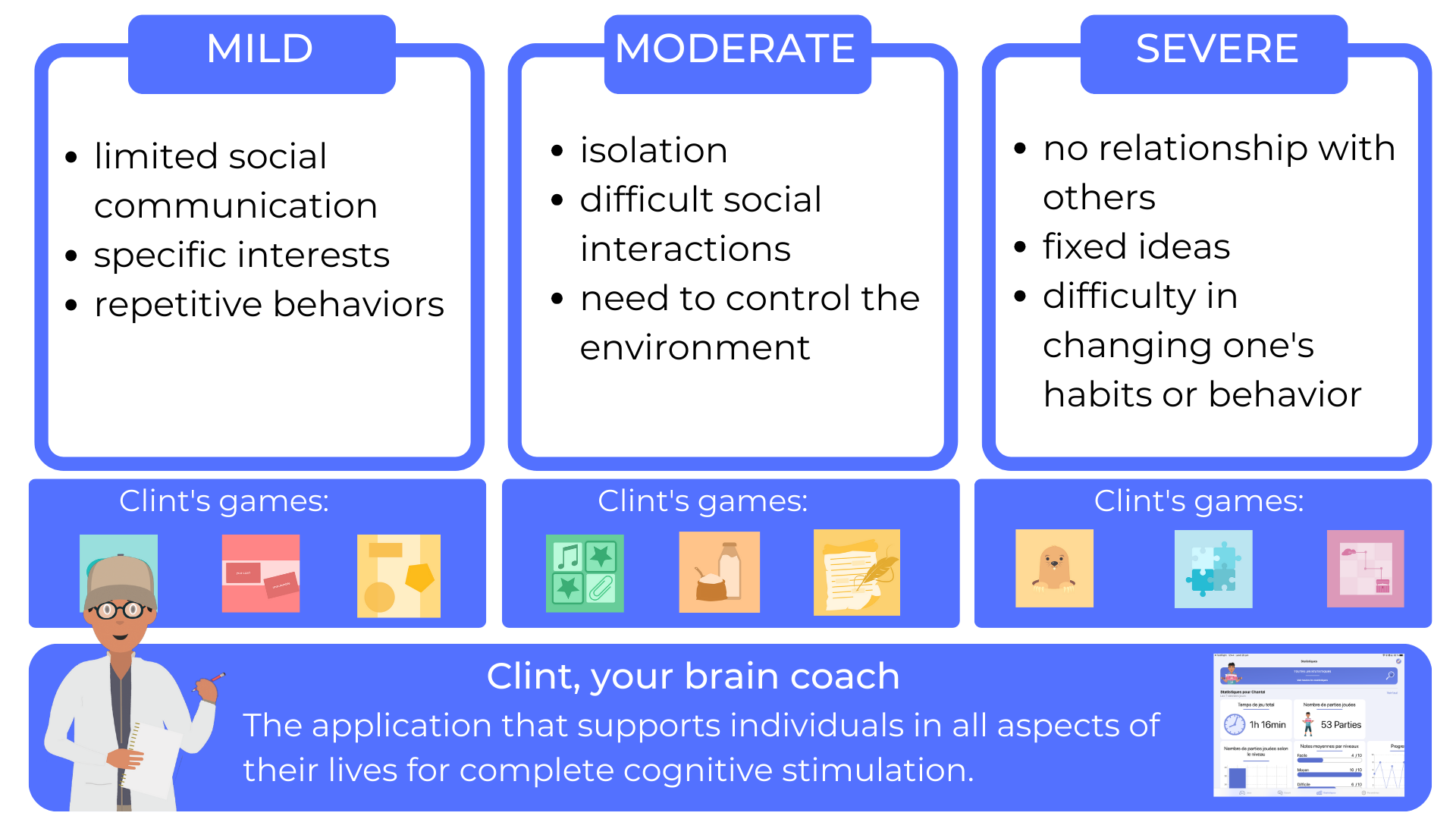
01.
GAMES ADAPTED ACCORDING TO THE FORM OF AUTISM
Discover the most suitable games for adults with autism with the CLINT program.

Granny Cooks

Simili

Puzzle plus
FORMS OF AUTISM
There are different forms of autism, so each person is different, with specific difficulties and needs. So it’s important to personalize the work for each individual. With Clint, this personalization is possible; the application adapts to the adult and his or her needs, but also to the professional and his or her therapeutic objectives.
With 3 levels of difficulty, Clint can be used and adapted for all types of autism.
Mild Form
In this form of autism, the person has problems with social interaction, communication or understanding others. She may also invest little in relationships and utter atypical sentences. Specific, limited interests or repetitive behaviors may also be observed.
Quizzle
Answer general knowledge questions.
With this game, you stimulate conversation thanks to the question/answer format. You can choose the classic mode to stimulate the formulation of coherent, appropriate responses. Later, you can ask for a more in-depth response to stimulate dialogue.
The question/answer format also helps to understand the direction of the conversation, to give space to the interlocutor and to listen.
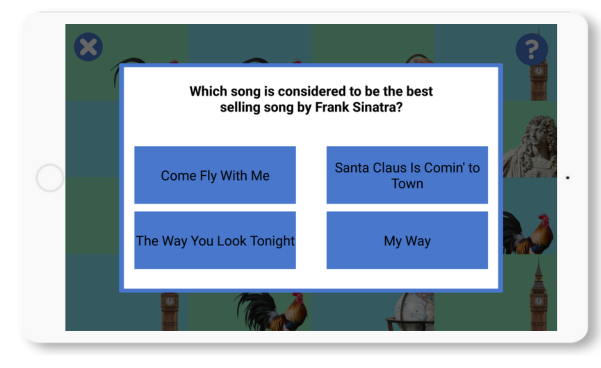
In this game, you’ll find questions on history, art, literature, music, sports and much more. So you can vary the topics of discussion.
This game also stimulates your attention and comprehension to understand the question, and your memory to find the right answer.
Brainstorming
Put the words in the right order to create the proverb.
This game stimulates functional language (cognitive function) and social language (social communication).
The person has to read and understand the different words. She then has to create a mental image to try out the possible combinations until she finds the right order.
To find the right order, we stimulate sentence structuring and semantic analysis (by asking questions such as “What is the subject of the sentence?”, “What is the verb?”).
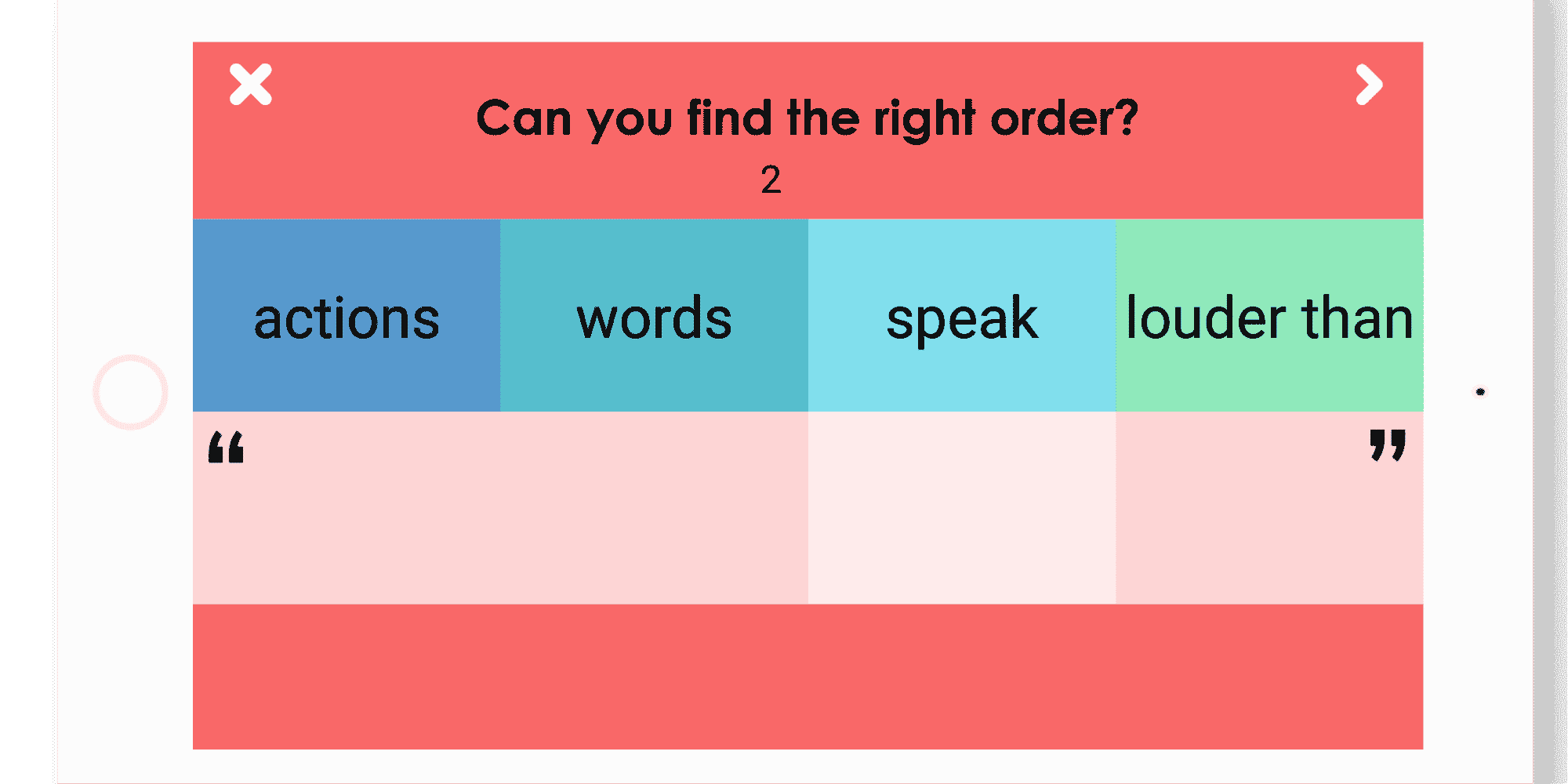
This game also helps to develop social language skills. Proverbs stimulate understanding and differentiation between the literal and figurative meanings of words/expressions. For example, the proverb “When you dance, you must dance” doesn’t literally mean that you must start dancing, but that once you’ve started something, you must finish it.
The person can also learn proverbs, better recognize them in conversations and act accordingly.
Moderate Form
In this form of autism, symptoms are more pronounced, and the adult may become isolated and have difficulty interacting with others. The person may feel frustrated when they can’t control their environment, when they can’t control a behavior or when there are too many external stimuli that are difficult to manage.
Simili
Find the double image among the suggested images.
This game stimulates active research on the part of the player. The proposed images change with each round (10 rounds per game), so the stimuli present are constantly evolving, and the person must adapt to the proposed images without knowing which ones will appear.
The task remains fixed throughout the game, and the autistic adult has a known context in which to play. To find the double image, visual exploration and analysis are stimulated to identify each image.

Attention is also stimulated, as the person has to analyze all the images, but also activation and inhibition of movement, as they have to wait to find the double image (inhibition of movement during the search) and, once they’ve found it, click on it (rapid activation).
Finally, you can use this game together to maintain the relationship. The first person to find the double image must touch it on the screen or say the name of the image.
Granny Cooks
Memorize the recipe or ingredients.
This game simultaneously stimulates different cognitive functions and social relationships.
First, the game shows the recipe and the adult has to memorize the ingredients.
It is possible to stimulate sequence in recipe mode (the autistic person has to remember the procedure) or verbal or visual memory in ingredient mode (the person has to remember the ingredients).
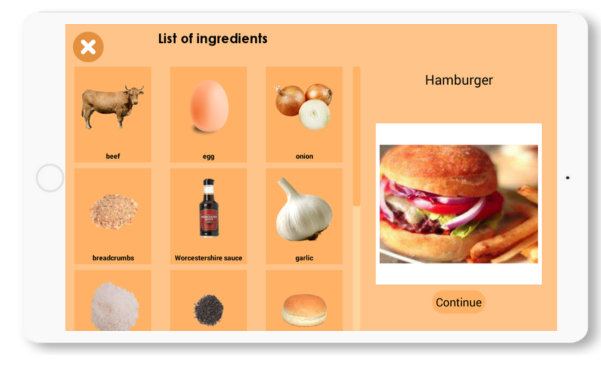
These skills are crucial to creating and maintaining autonomy.
This game helps to maintain a positive relationship, as it allows you to find the autistic adult’s favorite recipes, give his or her favorite ingredients or recall events related to the recipe.
Finally, to maintain the relationship, you can even look up a recipe on the game, memorize the steps or ingredients, and then cook it!
Severe Form
In this form of autism, the difficulties present are more severe. The autistic adult is unable to communicate with others or form relationships. In the most severe forms, there may be a form of non-verbal autism. The person may have fixed, repetitive ideas that they are unable to abandon. There’s a difficulty in changing mental patterns and a strong frustration when something doesn’t go as planned.
The Mole Invasion
Click on the moles as soon as they appear on the screen.
This game stimulates activation and inhibition, as there are 3 different moles requiring different actions: the normal mole must be touched once, the mole with the helmet twice and the mole with the glasses must not be touched.
The operator must use visual scanning to locate and identify the mole. It must adapt its behavior to the type of mole. As the action to be performed is not always the same, the person must modify his or her mental schema to act according to the stimuli present.

This game can also be played in pairs, with the screen divided into two sections. This helps to maintain the relationship with the autistic adult and to share the game with him/her.
Puzzle Plus
Put the puzzle back together with the pieces you have.
Puzzles are easy games that can also be played by people with a more severe stage of autism.
In this game, different images or photos can be found. The autistic adult can discover something new every day.
With several images available, it’s easier to change a person’s attention.
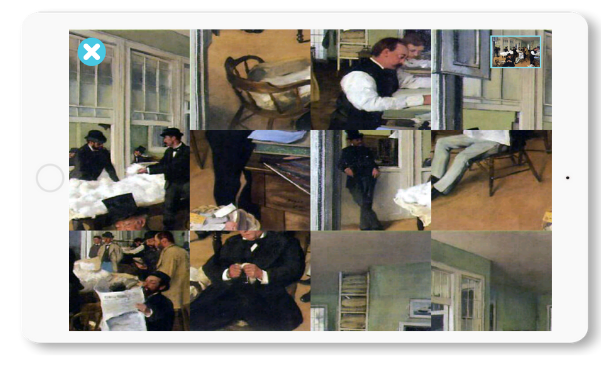
Visual perception is stimulated, as the adult has to analyze the different pieces presented, and visual-spatial construction, as he has to imagine the place of each piece to reproduce the final image.
What’s more, if a part isn’t in the right place, you can still move it to find the right solution. In this way, she can make several attempts and learn to deal with frustration.
In this game, you can ask for hints: you can stimulate the use of feedback and help the person adapt to the instructions and cues they receive.
02.
AREAS OF FRAGILITY IN AUTISM
An adult with autism may experience various difficulties, in different areas of development and with different intensity. Clint can be adapted for each stage of autism, and can also adapt to the cognitive functions to be stimulated.

Granny Cooks

Color Mind

Shape Box
Social interaction in adults with autism
Adults with autism have difficulty in social relationships because they cannot understand non-verbal language, irony or allusive phrases. They also have difficulty understanding other people’s moods or showing their emotions. Clint allows two players to play in certain games, enabling the player to create relationships in a protected context and learn strategies to better relate to others and manage emotions.
Shape box
Find the right shape or color for your model.
In two-player mode, each player has a button on his or her side of the screen, and objects move towards the center of the screen. So you have to share the tablet and look at the same objects.
In one game, there are 10 shapes to spot according to the pattern, allowing each player to earn points.
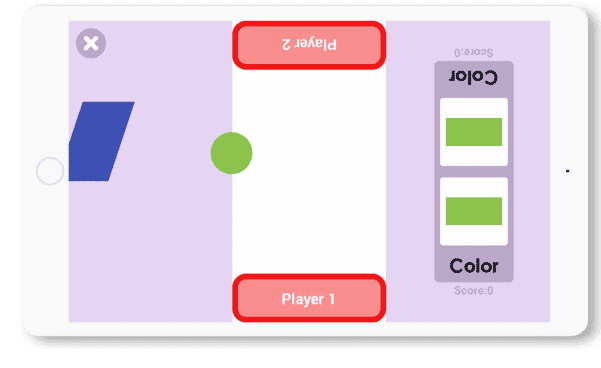
The person can learn to accept losing points during the game, but winning in the end, and therefore learn to lose by tolerating frustration.
In the course of the game, the person can show different types of emotions and learn to manage them better.
Twins
Memorize the position of the cards and find the double images as in the memory game.
This game can be played by two players, each taking a turn. Sharing the game can be stimulated, but so can turning and waiting for the other player (waiting for the other player to think about his or her move and touch the cards to be turned over).
In this game, the person can show different emotions (if they win, if they lose, if they fail…). You can help them to recognize and deal with all these emotions. You can also help them recognize other people’s emotions.
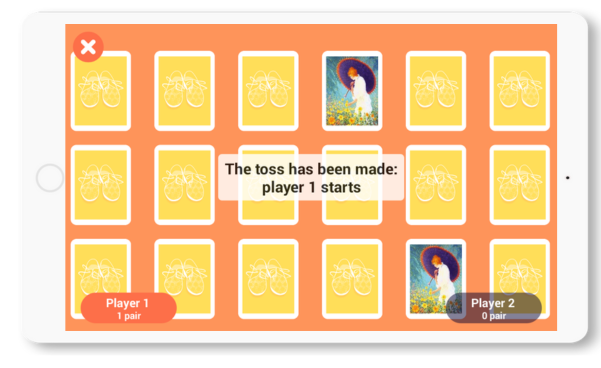
Memory games are familiar to everyone, and adults with autism can play them with friends and family.
Finally, this game stimulates other cognitive functions such as visual exploration, visual memory and immediate memory.
Interests and behavior of adults with autism
Adults with autism have limited interests that can become fixed ideas they can’t let go of. This fixation can lead to atypical behavior, with the person displaying stereotyped movements or rituals (for example, before walking through a doorway, he or she has to kick the floor). These fixations and rituals lead adults to have fixed, limited mental patterns. It is very difficult for him to enrich or modify the mental schemas used.
ColorForm
Find the same shape or color as the model.
In this game, the demand can change with each round (10 rounds per game), so the player has to adapt to the demand.
The aim of the game can be to find the shape, the color or the shape and color together.
These different modalities stimulate the activation and inhibition of movement, as the person has to remain focused in order to find the required object quickly (in the case where the autistic adult has to find the color twice in a row, then the shape, he or she has to inhibit the concept of “color” and activate that of “shape”).
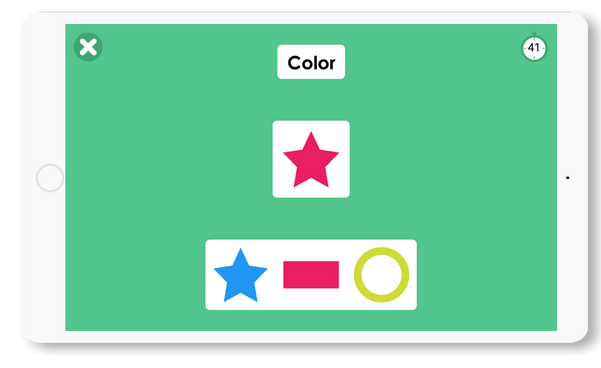
This activation or inhibition forces the person to change mental patterns several times and adapt to an external stimulus.
It also stimulates visual perception, attention, hand-eye coordination and reflexes. All these cognitive functions help people to enrich their mental schemas and find new strategies.
The cognitive aspect in adults with autism
Adults with autism may also present cognitive delays, manifested by problems with executive functions such as attention, memory, logic or planning. Cognitive disorders are not present in all forms of autism, but when they are, it’s important to support the person.
ColorMind
Remember the color sequence.
As the colors are easily recognizable, this game can also be used with adults with severe cognitive difficulties.
A sequence of colors is first displayed, then the person must remember and reproduce it.
This game stimulates attention and memory.
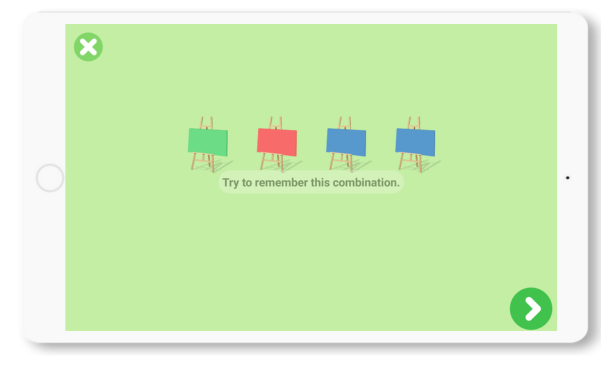
We can stimulate visual memory by simply asking the autistic adult to touch the color on the screen, or verbal memory by asking them to remember the names of the colors.
What’s more, each color is associated with a different sound, stimulating auditory discrimination or auditory memory.
Last but not least, this game increases the memory span, as the number of items to be memorized increases with the player’s success.
Clint the Pirate
Find the best route to take Clint to his treasure.
The arrows on the right are used to move the character. Depending on the possible directions, the arrows indicate only those directions. This adaptation will enable the game to be used with autistic adults with more severe cognitive disorders.
This game stimulates visual-spatial construction, as the player has to imagine the character’s movements in space.
In addition, planning is stimulated because the person has to look for the quickest route and watch out for obstacles.
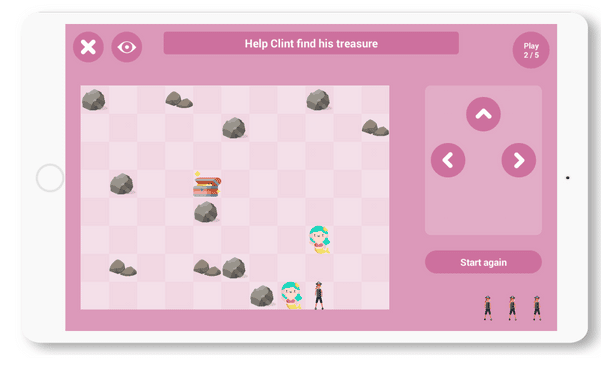
In this game, you can ask for cues: you can stimulate the use of feedback and help the person adapt to the instructions and cues they receive.
03.
ADULTS WITH AUTISM AND WORK
Adult autism and the workplace often benefit from inclusive policies and workplace adaptations to maximize the unique talents and contributions of autistic individuals.

Wild Cards
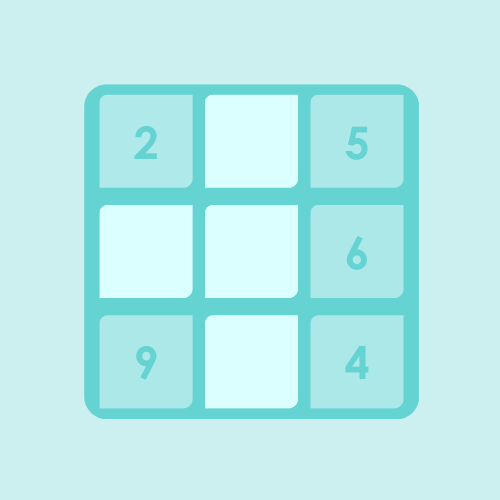
Sudoku

Calculus
Working with an adult with autism is not always easy, because different areas of development need to be taken into account, and the severity of the disorder changes depending on the situation. Clint also allows for adaptation thanks to 3 levels of difficulty: the person can use the application at his or her own level, but the application can also follow the person’s development (for example, the person can start with the easy level and move up to the medium level once he or she has achieved better skills). The games are designed to follow people’s development according to their age, skills and needs.
Autistic adults bring a diversity of skills and perspectives to the world of work, but they may also face specific challenges related to communication, socialization, and flexibility. To foster their professional development, it is crucial to put in place inclusive work environments that offer appropriate support and reasonable accommodations. This may include awareness programs for co–workers, alternative methods of communication, and adjustments in tasks or work schedules. By recognizing and valuing the unique skills of autistic adults, companies can benefit from a diverse and talented workforce, fostering a more equitable and rewarding work environment for all.
Wild cards
Don’t forget the order of the cards.
The images are simple so that adults can easily recognize them.
Depending on the level, the number of cards to be memorized is different (5, 6 or 7). Depending on the person’s cognitive level, the appropriate level can be chosen. For some people, memory space may be limited to 5. After training, they can move on to a longer sequence.
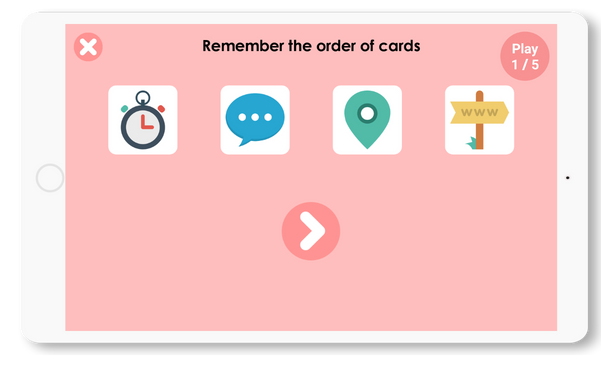
This game strengthens memory and concentration skills, helping to process complex information efficiently. By developing this ability, autistic adults can better handle tasks that require rigorous organization, such as project planning or data management.
This game also stimulates memory and other cognitive functions. For example, if the adult has good visual abilities, they can focus on images. If he has good verbal skills, he can memorize the names of the images.
Sudoku
Sudoku play is of particular importance for autistic adults in the professional context because it stimulates several essential cognitive skills. By solving Sudoku puzzles, adults with autism can improve their ability to solve problems, analyze information, and make logical decisions, skills that are crucial in many professional fields.
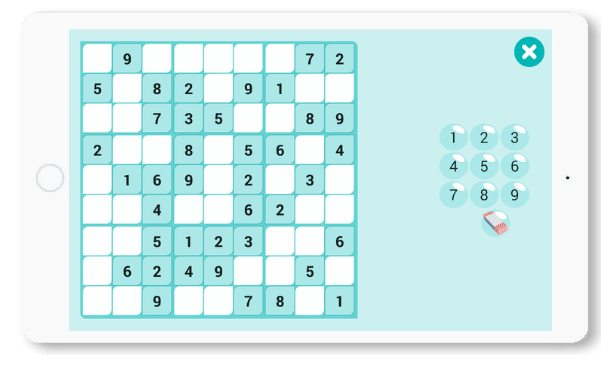
Additionally, Sudoku promotes concentration and patience, which can help individuals with autism maintain their attention on complex or repetitive tasks at work. In addition, this game offers a constructive leisure activity that can serve as a relaxing break, helping to reduce stress and promote mental well–being within the work environment.
Calculus
A mental arithmetic game reinforces their essential math skills. By practicing mental arithmetic exercises, autistic adults can improve their speed of processing digital information, which is especially beneficial in areas where quick calculations are required, such as financial management or data analysis.
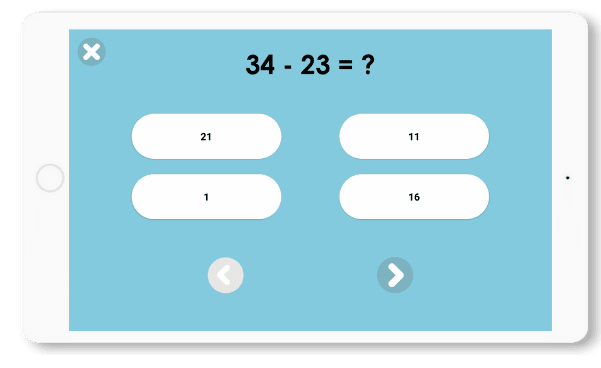
Additionally, this type of game encourages the development of concentration, memory, and accuracy, skills that are valuable in many professions. By providing a fun and challenging activity, the mental arithmetic game can also help boost self–confidence and motivation at work in adults with autism, while also providing an enjoyable way to keep their minds active and engaged.
MONITORING THE PROGRESS OF ADULTS WITH AUTISM
The CLINT program also includes a function that allows you to see the adult’s evolution over time. It’s possible to see the results and time spent on each game, to get feedback on the work done. This feedback can be useful during therapy to see if the person is achieving their goals, or at home to monitor their development.
In the Clint app, the “Stats“ tab offers a detailed view of your progress over time. You will find essential indicators such as the level of difficulty, the scores obtained, as well as a curve illustrating your evolution. This feature allows you to track your workout accurately and tailor the games to your specific needs. Having a clear vision of one‘s progress is crucial to fully integrating into adult life while being autistic. It is a valuable tool that allows you to better understand your skills and develop optimally.
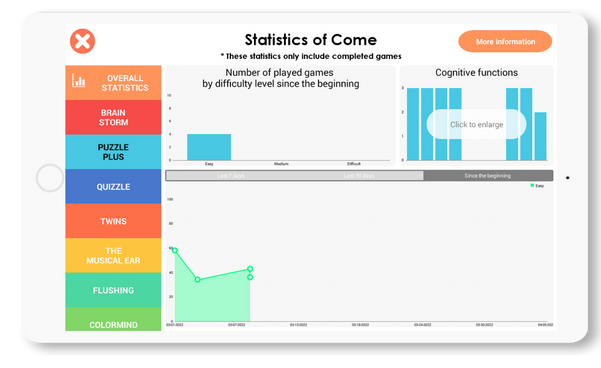
04.
EMOTIONS IN ADULTS WITH AUTISM
Emotions can be intense and complex and often require appropriate support and understanding from those around them.
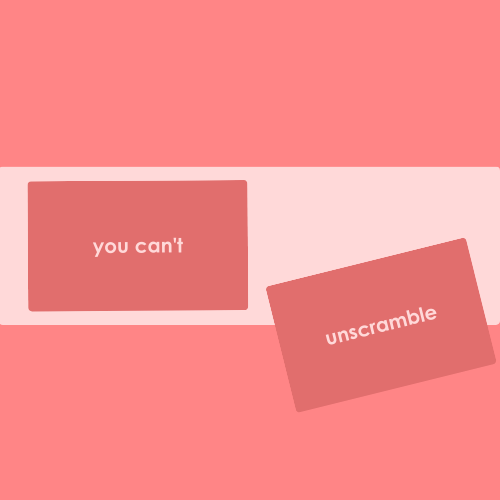
Brainstorming
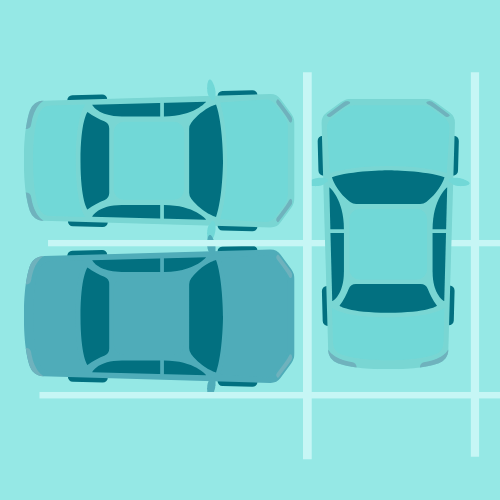
Congested Parking

Crazy Waterfall
1. Identify your emotions: Take the time to acknowledge and identify how you‘re feeling. Naming your emotions can help you better understand and manage them.
2. Learn your triggers: Try to identify situations, thoughts, or interactions that trigger intense emotions. Once you‘ve identified them, you can start developing strategies to manage them more effectively.

With Clint, we attach great importance to your emotions. You have the option to state how you‘re feeling, and based on your response, your coach Clint will recommend suitable activities or provide tips to improve your mood.
In addition, this feature allows you to share your emotions with your loved ones. Images can also be used to help you express yourself more easily.
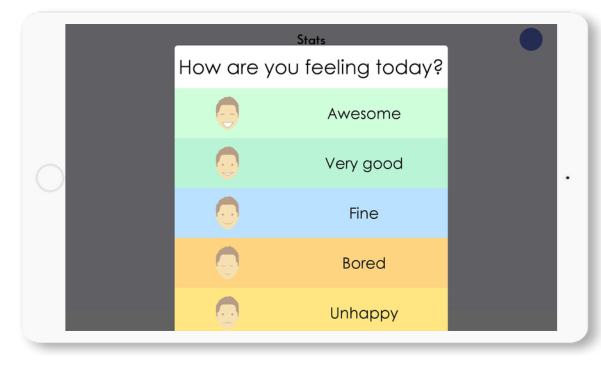
Flushing
Throw the ball back to your opponent.
This game provides an opportunity for structured social interaction, where participants can practice communication, coordination, and competition in a fun and safe way. They stimulate the development of cognitive skills, including strategic planning, quick decision–making, and concentration, while improving motor coordination and reflexes.
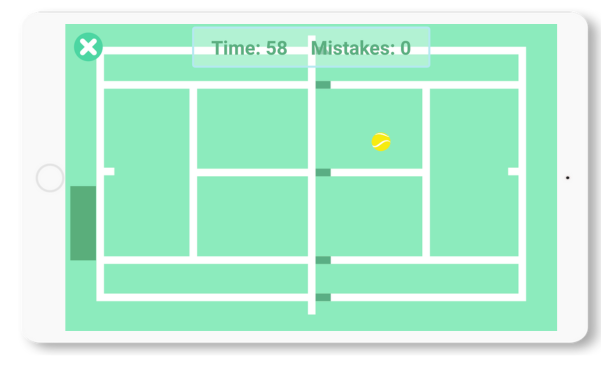
Hunting Intruders
Find the intruder between proposals.
Games where you have to find the intruder among four propositions are valuable for autistic adults. They stimulate logical thinking, visual perception, and the ability to concentrate. By identifying the intruder, players develop problem–solving and analytical skills. In addition, these games offer a fun activity that promotes learning while providing fun and satisfaction.
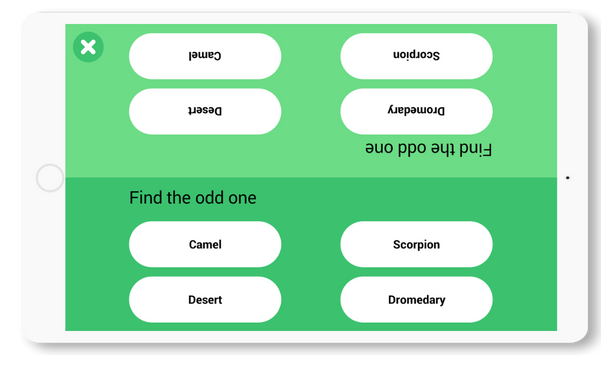
Crazy Chessboard
Memorize the position of the colored squares.
By exercising their visual memory, they develop important skills such as concentration, planning, and problem–solving. In addition, playing this type of game in tandem promotes social interactions and strengthens interpersonal bonds, creating a cognitively and emotionally rewarding experience.
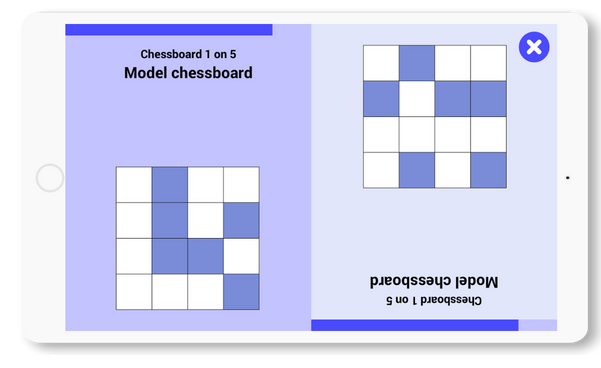
Here are the technical sheets of the games presented, with the cognitive functions stimulated by game
